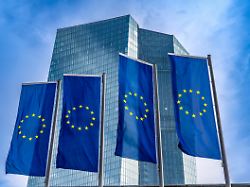slowed down
ECB raises interest rates by a quarter of a percentage point
05/04/2023, 02:17 p.m
The European Central Bank is taking its foot off the gas on its course to increase interest rates in the fight against high inflation. At its interest rate meeting in Frankfurt, it only raises key rates by a quarter of a percentage point. In March it went up half a point.
The euro currency watchdogs are slowing down somewhat in their seventh interest rate hike in a row. The Council of the European Central Bank (ECB) decided in the afternoon to raise key interest rates in the euro area by 0.25 percentage points. Previously, there had been three increases of 0.50 points. The key interest rate, at which commercial banks can get fresh money from the ECB, has now risen to 3.75 percent. If banks park money at the ECB, they will receive 3.25 percent interest in future, as the central bank announced in Frankfurt.
With the interest rate hikes that began last July, the monetary watchdogs are trying to curb high inflation. Higher interest rates make loans more expensive. This can slow down demand and counteract high inflation rates. In the medium term, the ECB is aiming for price stability in the euro area with an inflation rate of two percent. “Inflation has been above our target since mid-2021, so it has been too high for almost two years,” said ECB chief economist Philip R. Lane in a recent interview and announced another rate hike for the May meeting. “This is still not the right time to stop.”
In April, inflation in the euro zone picked up again somewhat. According to a first estimate by the statistics office Eurostat, consumer prices in the currency area of the 20 states were 7.0 percent above the level of the same month last year. In March, the annual rate of inflation in the euro zone had fallen significantly from 8.5 percent to 6.9 percent.
Turnaround in interest rates shakes banks
“The longer inflation remains too high, the greater the risk that people’s perceptions will change, that they will lose confidence in our ability to return to our 2% target,” Lane warned. Higher inflation rates cause purchasing power to dwindle: consumers can afford less for one euro. This weighs on economic growth, for which private consumption is an important pillar. On the other hand, rising interest rates make loans more expensive for companies, which is why one or the other investment could fail. This is also slowing down the economy. At the same time, the central bank no longer intends to use the funds from expiring securities from the general purchase program APP to purchase new bonds from July onwards. The ECB had already stopped buying fresh securities as part of the program on July 1, 2022.
The rapid turnaround in interest rates that the central banks in the USA and Great Britain initiated even before the ECB after years of extremely cheap money is not only positive for banks. This was most recently seen in the USA, where three institutions have already collapsed after enormous withdrawals of funds due to liquidity concerns. The US Federal Reserve raised its key interest rate for the tenth time in a row on Wednesday: After a jump of 0.25 percentage points, the key interest rate in the USA is now in a range of 5.0 to 5.25 percent.
